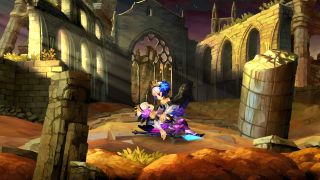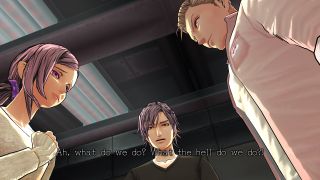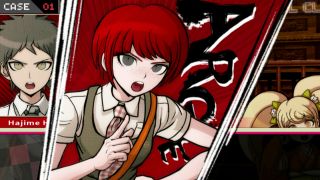If the Vita's dead, then why are there so many games right now?
It seems you can't go a single conversation about the Vita without having someone chime in with some permutation of the phrase: "Wait, there are games on the Vita?" Whether they're being cheeky or are honestly oblivious doesn't matter. There is a very real perception that Sony's high-tech handheld is a dead console walking; that it's only hanging onto life-support thanks to the vocal support of its fans.
I admit that I've felt a little burned by Sony's handling of the Vita platform. I wrote as much in a parody article around Gamescom in 2014, suggesting that the Vita had a bright future as a paperweight or flashlight, as Sony's two Vita-related announcements were 1) a Vita port of Papers, Please (mistakenly advertised for PS4, and still not out as of this publication), and 2) the arrival of a PS4 port of Vita darling Tearaway. E3 2016 came and went without a single mention of the Vita at Sony's press conference, as the console publisher elected to continue to push the PlayStation 4 and its upcoming VR headset. From the outside, it would appear that Sony has written the Vita off as a lost cause.

It might certainly be true, especially when you look at sales numbers for the Vita platform - or what few official numbers exist, at any rate. (One report pegs the Vita at around 4 million sold as of January 2013, but trying to pin down recent concrete figures is like trying to nail a LocoRoco to the wall.) It's struggled against a booming mobile and tablet market (as well as Nintendo's 3DS) since the beginning, and many have left it for dead. But here's the thing: games don't get released on a dead system. The word 'dead', other than the obvious meaning, implies a lack of support, that the Vita has zero new games, that no one is buying what games it does have. If the Vita is supposed to be dead, then why is 2016 one of the best years in its short history?
The perception that the Vita is 'dead' largely stems from Sony's lack of marketing or even mention of its existence, but it goes a little deeper than that. Sony first-party development studios have all but abandoned Vita, not even bothering to put flagship baseball title MLB The Show 16 on it. But more than that, typical third-party support has dried up as well, with games like Call of Duty giving the system a pass, and the mythical Bioshock Vita game disappearing completely. The system was billed as an extension of the console experience, allowing players to bring PS3-quality titles with them on the go, and while the Vita certainly has some of that, it's largely been a failure in that regard. It certainly never really caught on with the same crowd that bought over 40 million PS4s.

But a discussion I had with Susan Arendt and Anthony John Agnello on a recent RadioRadar+ podcast brought to light a different perspective on the supposedly dead handheld. We spent nearly an hour discussing three different yet equally incredible Vita games we'd been playing: Grand Kingdom, Odin Sphere Leifthrasir, and Zero Time Dilemma. All three games are multiplatform (the first two are also available on PS4, the latter on 3DS), but we'd been playing all three of them on our Vita, trading the power of the PS4 and the ubiquitousness of the 3DS for the portability and gorgeous screen of Sony's handheld.
And that's just three titles that were released in June; God Eater: Resurrection, Steamworld Heist HD, and Lego Star Wars: The Force Awakens also came out within a couple weeks of each other. We got one of the best Vita games ever made in Severed back in April. 2K released a surprise port of XCOM: Enemy Unknown in March. And while Square Enix originally abandoned the Vita, opting not to release the upcoming JRPG I Am Setsuna on the handheld in the West, it seems the Japanese publisher has reconsidered, stealth-releasing Adventures of Mana (a game it had adamantly declared it wouldn't release in Western territories), as well as bringing both Dragon Quest Builders and World of Final Fantasy later this year. Many of these Vita versions are often just as good as their console counterparts, too, which is great for those who want the benefit of portability without sacrificing features or graphical fidelity.

It doesn't stop there. Tons of indies like Octodad, Volume, Super Meat Boy, and many more have Cross-Buy support, giving you a complimentary Vita version of the game along with the console version, and many allow you to transfer saves back and forth - making the Vita the perfect portable indie gaming machine. And in case you're looking for physical versions of those indies, Limited Run Games is a boutique publisher who specializes in making relatively small physical print runs of digital games for PS4 and Vita, and has sold out nearly every single printing it's made. In 2016, the Vita has seen more releases than the 3DS, and if you want a certain kind of game to play, the Vita has you more than covered.
Sign up to the GamesRadar+ Newsletter
Weekly digests, tales from the communities you love, and more
Of course, that certain kind of game is smaller, less conventional, and less likely to gain traction with a larger, more mainstream audience. You're not going to get a GTA on Vita like you did on the PSP (a system which went through its own 'perpetual death spiral', as a matter of fact), but you will be able to play nearly every single mainline Final Fantasy or Metal Gear game on one platform. Or play fascinating, esoteric Japanese games like Danganronpa, Persona 4, or Oreshika: Tainted Bloodlines. Or stuff your (ridiculously expensive) memory card full of indie greats like Fez, Hotline Miami, Spelunky and many, many more.
The Vita's original vision as a platform for big-budget portable titles is over, but as mobile continues to be an uncertain path to success for many developers, studios have turned to the Vita and its small but ravenous audience to provide them with a sustainable future. It's got a gorgeous screen, a full suite of buttons, an incredible attach rate despite the smaller number of devices sold, and an audience willing to pay premium prices to avoid the sort of free-to-play pitfalls that currently plague the mobile market. So stop saying the Vita is dead; it's just found life as a portable niche-machine. And as long the audience is big enough for Sony to keep it around, that's just fine.
Most Popular





